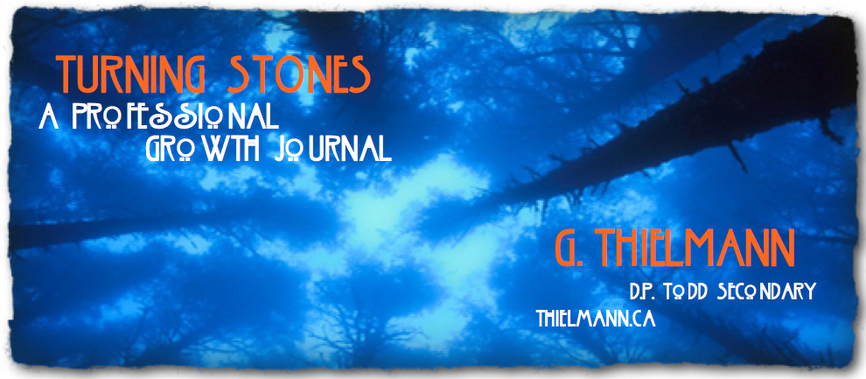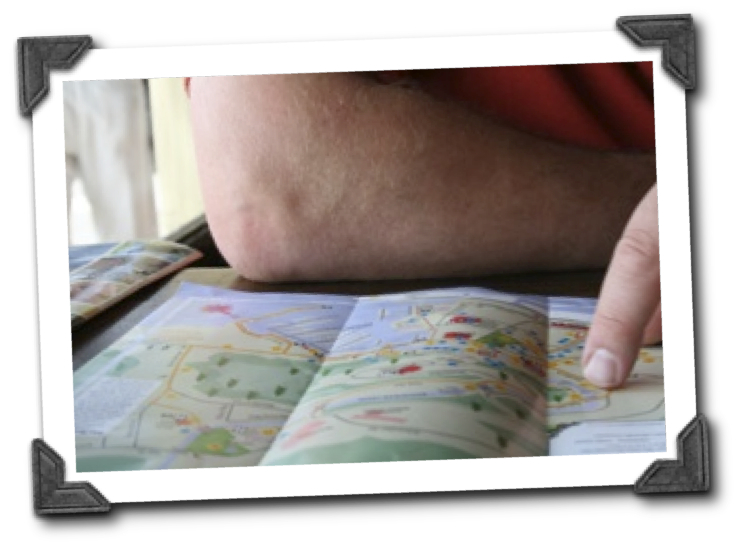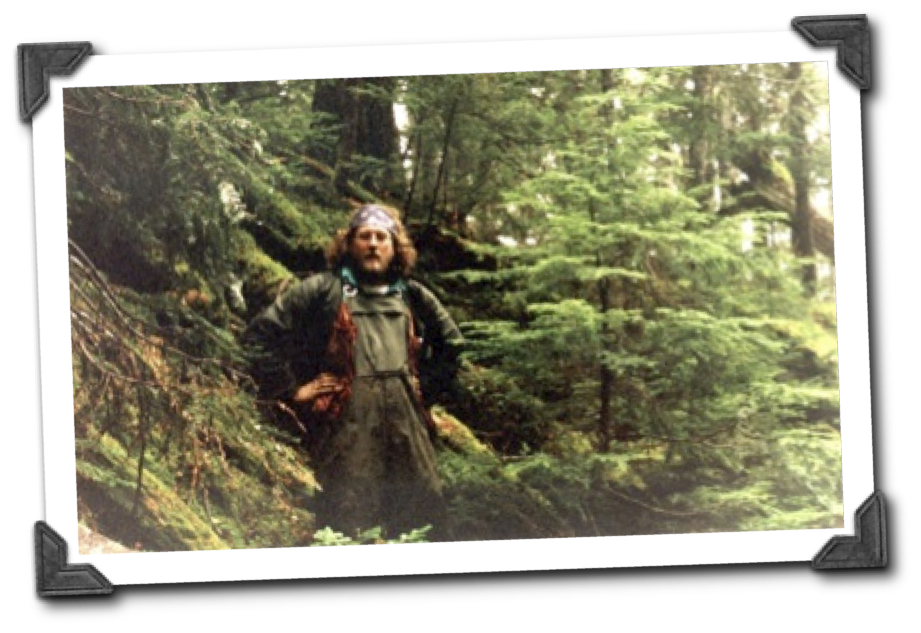Note, Fall 2019
I created versions of this "document" and used it from about 2010-2017 as a place to reflect on professional learning and set some goals for projects and professional development days. I mainly use twitter for that now, so I suppose this page is now an archive. Having had a quick read through just now, I'd have to say some of my thinking, and more importantly the influence on my thinking, has shifted since in the last few years.
Defining Professional Growth
|
Why do this? Why read this?
I have put this together to remind myself what I’ve been and where I think I’ll go, to be accountable to my peers, and share ideas with anyone who is looking. This is also a public (open) platform from which I can make connections between my professional practice, my beliefs & values, and the system in which I work. I have already learned from the process of drawing in ideas, goals, writings, and schemes into one place; it feels like a good spring cleaning and helps bring some closure to unanswered questions while setting my sights on new ones. If you -- colleague, student, parent, whomever -- want to question something you read here, to challenge me on my thinking, offer something fresh or at odds, or simply wish to comment, please feel free to contact me. To paraphrase Frou Frou: let go, jump in, whatcha waiting for, there’s beauty in the breakdown. |
What is professional development?
One of the neat things about being a teacher is the chance to be deliberately engaged in life-long learning. This happens during the work day, on my own time, on non-instructional days, and in summer. Personal and professional learning are part of an “ecology,” a connected cycle of theory-making, reflective practice, and action-research. This “pro-d” takes many forms for me:
There is a special role in my reflection (and thus this document) for interrogating the structures that accompany public education, for celebrating the emergence (in any form or context) of cultural attributes that signal a new attitude towards community development, environmental sustainability, total cost economies, and perhaps some other “cultural” values that reckon with my own. The BC public education system is rife with dysfunctional structures, shallow thinking, and misunderstood paradigms, but it is also filled with creative ideas, caring educators, curious students, and committed parents who are making moves towards new cultures of being that are good for people and the planet. When we see formal learning as a relationship between real people in community, more like a guild and less like a factory, the bizarre eduspeak and various social agendas attending our system can be broken down and allowed to find their appropriate place. A central irony in my practice is that I seek some form of disruption, not unlike the calls for education reform from our own government, and yet the approach reformers take is almost always at odds with both my way of thinking and what I believe to be sound politics, discourse, and progress. I suppose I am fated to dwell midst the irony, and do so as a polemic loner.
I have also come to realize that in order to remain caring, hopeful, and optimistic as an educator, I have to own my trajectory and work towards my dreams with or without the support or understanding of structures and people around me, while at the same time working to improve the structures and listen to others. This hit home for me while listening to Stephen Lewis’ eulogy for Jack Layton (Aug 27/11). The basic idea that caring public service starts with a desire for fairness and mutual aid is a deep conviction and compelling goal.
One of the neat things about being a teacher is the chance to be deliberately engaged in life-long learning. This happens during the work day, on my own time, on non-instructional days, and in summer. Personal and professional learning are part of an “ecology,” a connected cycle of theory-making, reflective practice, and action-research. This “pro-d” takes many forms for me:
- conducting research and reflecting on how, what, and why students learn, and understanding the educational landscape in which this takes place
- learning more about my subject area as I plan for lessons, read and write on topics like democracy, citizenship, environment, sustainability, and history, and focus on what students do/can’t do/could do/should do
- participating with other educators in collaborative discussions and projects on topics like heritage research, identity & inquiry, analyzing trends in current events, authentic balanced practice, critical thinking, meaningful assessment, and educational technology
- independent study, course design, textbook review/writing, advocacy for public education, and follow-up on all the powerful questions raised by colleagues and students.
There is a special role in my reflection (and thus this document) for interrogating the structures that accompany public education, for celebrating the emergence (in any form or context) of cultural attributes that signal a new attitude towards community development, environmental sustainability, total cost economies, and perhaps some other “cultural” values that reckon with my own. The BC public education system is rife with dysfunctional structures, shallow thinking, and misunderstood paradigms, but it is also filled with creative ideas, caring educators, curious students, and committed parents who are making moves towards new cultures of being that are good for people and the planet. When we see formal learning as a relationship between real people in community, more like a guild and less like a factory, the bizarre eduspeak and various social agendas attending our system can be broken down and allowed to find their appropriate place. A central irony in my practice is that I seek some form of disruption, not unlike the calls for education reform from our own government, and yet the approach reformers take is almost always at odds with both my way of thinking and what I believe to be sound politics, discourse, and progress. I suppose I am fated to dwell midst the irony, and do so as a polemic loner.
I have also come to realize that in order to remain caring, hopeful, and optimistic as an educator, I have to own my trajectory and work towards my dreams with or without the support or understanding of structures and people around me, while at the same time working to improve the structures and listen to others. This hit home for me while listening to Stephen Lewis’ eulogy for Jack Layton (Aug 27/11). The basic idea that caring public service starts with a desire for fairness and mutual aid is a deep conviction and compelling goal.
Orientation to Beliefs and Values
What are some of my primary pro-d goals and interests as an educator?
My work with students and educators focuses on the emergent identity of learners, the social, geographical, metaphoric, and curricular lenses by which this can be examined, and an assessment of the transformative experiential and technological tools by which this emergence can be realized. In short, I’m interested in contexts.
While modern Canadian History and is compelling and occupies most of the curriculum within my teaching assignment, I have a particular interest in regional British Columbia history and geography, and Canadian immigration stories from the 18th to early 20th century. My approach to all subjects is to engage student and educator identity (a product of both heritage and culture) in the exploration of significant and useful learning. This is supported with a reliance on authentic inquiry and assessment. One example of the boundary between my interests and the work I ask of students is the use of project-based learning in the area of heritage research, a combination of critical thinking and personal reconstruction of history through interviews and analysis of personal sources and modalities.
Underpinning my beliefs and values is a notion that a new culture is needed in our society, one that can be (should be) influenced by what happens in my classroom -- a culture of active citizens pursuing creative, intelligent, and connected pathways towards a sustainable future; grounded individuals who challenge the dominant culture on issues of relevance and who seek out new ways for values of community, heritage, and ecologically resilient adaptations to emerge.
My work with students and educators focuses on the emergent identity of learners, the social, geographical, metaphoric, and curricular lenses by which this can be examined, and an assessment of the transformative experiential and technological tools by which this emergence can be realized. In short, I’m interested in contexts.
While modern Canadian History and is compelling and occupies most of the curriculum within my teaching assignment, I have a particular interest in regional British Columbia history and geography, and Canadian immigration stories from the 18th to early 20th century. My approach to all subjects is to engage student and educator identity (a product of both heritage and culture) in the exploration of significant and useful learning. This is supported with a reliance on authentic inquiry and assessment. One example of the boundary between my interests and the work I ask of students is the use of project-based learning in the area of heritage research, a combination of critical thinking and personal reconstruction of history through interviews and analysis of personal sources and modalities.
Underpinning my beliefs and values is a notion that a new culture is needed in our society, one that can be (should be) influenced by what happens in my classroom -- a culture of active citizens pursuing creative, intelligent, and connected pathways towards a sustainable future; grounded individuals who challenge the dominant culture on issues of relevance and who seek out new ways for values of community, heritage, and ecologically resilient adaptations to emerge.
What are some criteria I use to determine whether to join in a pro-d offering
First, it needs to appeal to at least some of the values expressed above -- this will assure both relevance to my practice and to my students. It should be the result of an open, intelligent, and inclusive process of planning -- something that addresses a thoughtful question, timely issue, or obvious need. Ideally, the topics are fresh, applicable, and somewhat original. I don’t want to repeat the same ideas over and over unless I have some new role to play as a participant, and I don’t want to feel dumbed down, talked down to, or subjected to rudimentary skills, ideas, or practices. Why bother mentioning this? Like many teachers, I've suffered through many pro-d sessions that broke with these principles; this is one of the reasons why I've become more involved with professional issues as a teacher. I love hands-on and embodied professional learning, around a fire is ideal, but I also don't mind settling in for a good talk or joining a table for conversation.
First, it needs to appeal to at least some of the values expressed above -- this will assure both relevance to my practice and to my students. It should be the result of an open, intelligent, and inclusive process of planning -- something that addresses a thoughtful question, timely issue, or obvious need. Ideally, the topics are fresh, applicable, and somewhat original. I don’t want to repeat the same ideas over and over unless I have some new role to play as a participant, and I don’t want to feel dumbed down, talked down to, or subjected to rudimentary skills, ideas, or practices. Why bother mentioning this? Like many teachers, I've suffered through many pro-d sessions that broke with these principles; this is one of the reasons why I've become more involved with professional issues as a teacher. I love hands-on and embodied professional learning, around a fire is ideal, but I also don't mind settling in for a good talk or joining a table for conversation.
What are some of the broader influences that inform my identity and my personal and professional growth? (this is a necessarily "historical" list, perhaps better matched to the earliest influence on my practice... some of these ideas have certainly faded over time, or come and go)
Just Society
Just Society
- Canadian relationships, values and community more important than statehood and nationalism
- the context for all other forms of free political and economic experiments is a free, secure, and socially cohesive nation that respects its distance on key issues
- reconciliation between Indigenous and non-Indigenous peoples as an ongoing theme in collective identity
- equality (freedom) balanced with fairness (social safety)
- Middle Power, agency, diplomacy, compassion, liberty
- Pierre Trudeau, Stephen Lewis, Romeo Dallaire, Tommy Douglas, Jane Addams
- identity as a neural narrative, society as a geographic narrative
- self in relation to horizons of significance and authenticity
- self in exploration: dead reckoning vs comprehensive map
- consciousness as the narrative centre of gravity
- society as the outcome of human adaptive strategies
- Daniel Dennett, Jared Diamond, Charles Taylor (the philosopher, not the Liberian dictator)
- To what extent should divergent questions be the basis of education?
- How do these influences hold up to postmodern and postcolonial analysis?
- What is the cusp between self and society? How appropriate is it to think of them on a continuum?
- What pulls harder, human agency or resource base, when considering adaptive strategies
- Neil Postman, Charles Weingartner, David Suzuki, Jesus of Nazareth, Carl Sagan
- ecological model and metaphor for systems organization at many levels
- informing context for sustainability and human-environment relationship
- basis for understanding social ecology, sociogeography, ecopsychology, ecotherapy, indigenous perspectives
- provision and inspiration for narratives of identity
- orientation for environmental ethos (in contrast to other ways of approaching environmentalism)
- David Suzuki, H.D. Thoreau, Aldo Leopold, E.W. Teale, Murray Bookchin, David Abrams, Theodore Roszak, Chris Maser
- free market socialism. labour credits, barter system
- mutual aid, the role of cooperation in species & system success
- Peter Kropotkin, P.J. Proudhon, Ivan Illich, Kevin Carson
- Jura Watchmakers Federation in Switzerland
- Swaraj, home-rule, self-governance, community building
- political & economic decentralization
- regenerate new reference points, systems, and structures that enable individual and collective self-development
- M. Gandhi, Helen and Scott Nearing, Ken Kearn,
- Indian independence movement, intentional communities, bioregionalism, 100-mile diet
- individual will comes before external ideals and social/political constructions
- evolution over revolution
- free associations in society, no coercion or manufactured consent
- Noam Chomsky, H.D. Thoreau, George Woodcock, William Godwin, M. Gandhi, Benjamin Tucker
- related to nonviolence, passive resistance, pacifism, noncoercion, aspects of civil disobedience
- strategy for social change discouraging resistance to an enemy or simply discouraging violence
- important connection with Anabaptist/Mennonite beliefs and practices
- Menno Simons, Henry David Thoreau, Socrates, Leo Tolstoy, M. Gandhi, Vaclev Havel, J.H. Yoder, Jacques Ellul
- Quit India Campaign, Velvet Revolution, African-American Civil Rights Movement, Arab Spring
- aspects of anarcho-feminism, post-modern feminism, ecofeminism, feminist geography
- value of analyzing society and thought from a new perspective
- gendered and postgender politics, ecology, sociology, social justice
- Stephen Lewis, Emma Goldman, Mary Wollstonecraft, Naomi Klein
- theory of conscisousness and existance that provides both mystery and scientific understanding
- a context for the sensing and thinking and acting that takes place in one’s “lifeworld”
- Jean-Paul Sartre, Edmund Husserl, Martin Heidegger, Maurice Marleau-Ponty, Simone de Beauvoir
- West coast sensibility, Pacific Slope Orientation
- landscape as a relationship negotiated by art & poetry
- cultural landscapes of BC hold connected stories
- wider context for the practice of bioregionalism
- home of Sasquatch, bears, salmon, doug fir, redcedar, swordfern, and so many other formative denizens of the canopy, understory, and forest floor
- Emily Carr, M.A. Grainger, Peter Trower, Kirkpatrick Sale, John Green (Sasquatch guy, not the author of teen novels)
- organic relationship between people and their living spaces
- society as the outcome of geographic narratives
- bioregional contexts for dasein (home-instinct) and topophilia (love of place)
- pattern language(s) affecting adaptative strategies at many scales
- Christopher Alexander, Lewis Mumford, Jane Jacobs, Tom Brown, Wendell Berry, Robert Kroetch, Tim Lilburn, Bruce Chatwin
- the power of myth, language, and imagination to explore and develop core values
- recreating ideal geographies and societies
- imaginative landscapes and narratives as historical experimentation, identity playground, and insight into the nature of power
- J.R.R. Tolkien, C.S. Lewis, the Biblical Narrative, Beowulf, Norse Saga, Germanic Folk & Fairy Tales, Arthurian Legends, Robin Hood, Isaac Asimov
- embracing irony and submitting to metaphor
- struggling with innocence and experience and the proliferation of resemblances
- understanding language, words, speech, meaning, sensing
- exploring the threshold of the imagination
- the power of hearth-words and stories, heroics, beauty, embodiment
- William Blake, Walt Whitman, Wallace Stevens, Allan Ginsberg, Peter Trower, John Sorrell, Derk Zimmer


